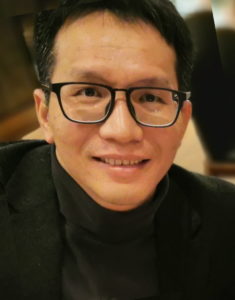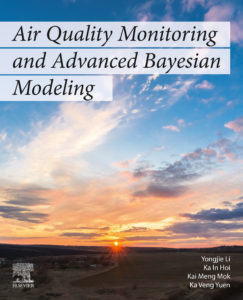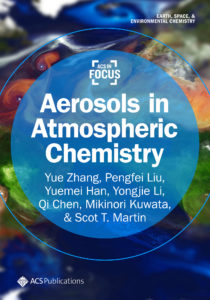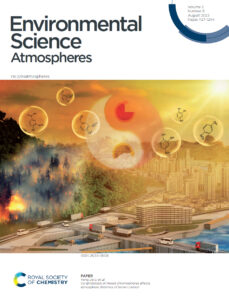YJL Group

Yongjie Li 黎永杰
Associate Professor, University of Macau
澳門大學,副教授
Post-Doc, Harvard University
哈佛大學,博士後
Ph.D., The Hong Kong University of Science and Technology (HKUST)
香港科技大學,博士
B.Sc., Peking University (PKU)
北京大學,學士
Research Interests:
- Atmospheric Chemistry 大氣化學
- Aerosol Science 氣溶膠科學
- Mass Spectrometry 質譜應用
- Environmental Analysis 環境分析
2022, Aug – present: Associate Head, Department of Civil and Environmental Engineering, University of Macau
2021, Aug – present: Associate Professor, University of Macau
2015, Aug – 2021, Aug: Assistant Professor, University of Macau
2014, Apr – 2015, Aug: Post-doctoral Fellow, Harvard University
2010, Sep – 2014, Apr: Post-doctoral Fellow and Research Associate, The Hong Kong University of Science and Technology
2009, Jan – 2009, Jun: Visiting Scholar, School of Engineering and Applied Sciences, Harvard University
2005, Sep – 2006, Jul: Teaching Assistant, Department of Chemistry, The Hong Kong University of Science and Technology
2004, Sep – 2005, Jul: Research Assistant, College of Chemistry and Molecular Engineering, Peking University
- Incentive Scheme for Outstanding Academic Staff, University of Macau, 2023
- Asian Young Aerosol Scientist Award, Asian Aerosol Research Assembly, 2022
- Research Excellence Award, Faculty of Science and Technology, University of Macau, 2020
- China Aerosol Young Scientist Award, Chinese Society of Particuology, 2019
- Research Excellence Award, Faculty of Science and Technology, University of Macau, 2017
- Best Young Researcher Award, The 4th International Workshop on Regional Air Quality in Rapidly Economic Developing Regions (4RAQM), Hong Kong, 2014
- Young Scientist Support and Young Scientist Poster Award, International Global Atmospheric Chemistry (IGAC) Science Conference, Beijing, 2012
- Overseas Research Award, The Hong Kong University of Science and Technology, 2008
Books


- Li Y.J., Hoi K.I., Mok K.M., Yuen K.V., Air Quality Monitoring and Advanced Bayesian Modeling, Elsevier, 2023.
- Zhang Y., Liu P., Han Y., Li Y.J., Chen Q., Kuwata M., Martin S.T., Aerosols in Atmospheric Chemistry, ACS In Focus, American Chemical Society, 2022.
Journal papers
- Wang Y., Qiu T., Zhang C., Hao T., Mabato B.R.G., Zhang R., Gen M., Chan M.N., Huang D.D., Ge X., Wang J., Du L., Huang R.J., Chen Q., Hoi K.I., Mok K.M., Chan C.K., Li Y.J.*, Co-photolysis of mixed chromophores affects atmospheric lifetimes of brown carbon, Environ. Sci.: Atmos., 2023, 10.1039/D3EA00073G

- Tian L., Huang D.D.*, Wang Q., Zhu S., Wang Q., Yan C., Nie W., Wang Z., Qiao L., Liu Y., Qiao X., Guo Y., Zheng P., Jing S., Lou S., Wang H., Yu J.Z., Huang C., Li Y.J.*, Underestimated Contribution of Heavy Aromatics to Secondary Organic Aerosol Revealed by Comparative Assessments Using New and Traditional Methods, ACS Earth Space Chem., 2023,7: 110–119.
- Tian L., Huang D.D.*, Li Y.J.*, Yan C., Nie W., Wang Z., Wang Q., Qiao L., Zhou M., Zhu S., Liu Y., Guo Y., Qiao X., Zheng P., Jing S., Lou S., Wang H., Huang C., Enigma of Urban Gaseous Oxygenated Organic Molecules: Precursor Type, Role of NOx, and Degree of Oxygenation. Environ. Sci. Technol., 2022, 57: 64-75.
- Zeng L., Huang D.D.*, Zhu S., Li F., Zhou M., Qiao L., Wang Q., Wang Q., Ma Y., Lou S., Shi H., Hoi K., Mok K.M., Ge X., Wang H., Yu J.Z., Huang C., Li Y.J.*, The interplays among meteorology, source, and chemistry in high particulate matter pollution episodes in urban Shanghai, China, Sci. Total Environ., 2022, 853: 158347, https://doi.org/10.1016/j.scitotenv.2022.158347.
- Wang Y., Huang W., Tian L., Wang Y., Li F., Huang D.D., Zhang R., Mabato B.R.G., Huang R.J., Chen Q., Ge X., Du L., Ma Y.G., Gen M., Hoi K.I., Mok K.M., Yu J.Z., Chan C.K., Li X., Li Y.J.*, Decay Kinetics and Absorption Changes of Methoxyphenols and Nitrophenols during Nitrate-Mediated Aqueous Photochemical Oxidation at 254 and 313 nm, ACS Earth Space Chem., 2022, 6: 1115–1125.
- Wang Y., Huang D.D., Huang W., Liu B., Chen Q., Huang R.J., Gen M., Mabato B.R.G., Chan C.K., Li X., Hao T., Tan Y., Hoi K.I., Mok K.M., Li Y.J.*, Enhanced Nitrite Production from the Aqueous Photolysis of Nitrate in the Presence of Vanillic Acid and Implications for the Roles of Light-Absorbing Organics, Environ. Sci. Technol., 2021, 55: 15694–15704.
- Cheng X., Chen Q.*, Li Y.J.*, Zheng Y., Liao K., Huang G.C., Highly oxygenated organic molecules produced by the oxidation of benzene and toluene in a wide range of OH exposure and NOx conditions, Atmos. Chem. Phys., 2021, 21: 12005-12019.
- Li Y., Liu B., Ye J., Jia T., Khuzestani R.B., Sun J.Y., Cheng X., Zheng Y., Li X., Wu C., Xin J., Wu Z., Tomoto M.A., McKinney K.A., Martin S.T., Li Y.J.*, and Chen Q.*, Unmanned Aerial Vehicle Measurements of Volatile Organic Compounds over a Subtropical Forest in China and Implications for Emission Heterogeneity, ACS Earth Space Chem., 2021, 5: 247-256.
- Chen X., Chu Y., Lee A.K.Y., Gen M., Kasthuriarachchi N., Chan C.K., Li Y.J.*, Relative humidity history affects hygroscopicity of mixed particles of glyoxal and reduced nitrogenous species, Environ. Sci. Technol., 2020, 12: 7097-7106.
- Liu B., Wu C., Ma N., Chen Q., Li Y., Ye J., Martin S.T., Li Y.J.*, Vertical profiling of fine particulate matter and black carbon by using unmanned aerial vehicle in Macau, China, Sci. Total Environ., 2020, 709: 136109.
- Li J., Liu Q., Li Y.J.*, Liu T., Zheng J., Zhu W., Hu M., Wu Y., Lou S., Hallquist A.M., Hallquist M., Chan C.K., Canonaco F., Prevot A.S.H., Fung J.C.H., Lou A.K.H., Yu J.Z.*, Characterization of aerosol aging potentials at suburban sites in northern and southern China utilizing a potential aerosol mass (Go:PAM) reactor and HR-ToF-AMS, J. Geophys. Res.
Atmos., 2019, 124: 5629-5649. - Liu B., He M., Wu C., Li J., Li Y., Lau N.T., Yu J.Z., Lau A.K.H., Fung J.C.H., Hoi K.I., Mok K.M., Chan C.K., Li Y.J.*, Potential exposure to fine particulate matter (PM2.5) and black carbon on jogging trails in Macau, Atmos. Environ., 2019, 198: 23-33.
- Qin Y.M., Tan H.B., Li Y.J.*., Li Z.J., Schurman M.I., Liu L., Wu C., Chan C.K.*, Chemical characteristics of brown carbon in atmospheric particles at a suburban site near Guangzhou, China, Atmos. Chem. Phys., 2018, 18: 16409-16418.
- Qin Y.M., Tan H.B., Li Y.J.*, Schurman M.I., Li F., Canonaco F., Prevot A.S., Chan C.K.*, Impacts of traffic emissions on atmospheric particulate nitrate and organics at a downwind site on the periphery of Guangzhou, China, Atmos. Chem. Phys., 2017, 17: 10245-10258.
- Li Y.J.*, Sun Y., Zhang Q., Li X., Li M., Zhou Z., Chan C.K.*, Real-time chemical characterization of atmospheric particulate matter in China: A review, Atmos. Environ., 2017, 158: 270-304.
- Li Y.J.*, Liu P.F., Bergoend C., Bateman A.P., Martin S.T.*, Rebounding hygroscopic inorganic aerosol particles: Liquids, gels, and hydrates, Aerosol Sci. Technol., 2017, 51: 388-396.
A full publication list and citation metrics can be found in:
We study the chemical composition and the dynamic evolution of air pollutants such as particulate matter (PM), ozone (O3) and volatile organic compounds (VOCs). Specifically, we measure the chemical composition of complex mixtures in PM and VOCs, which is vital for us to understand their emission sources or the chemical process leading to their formation; we also simulate the chemical reactions (e.g., aqueous-phase photolysis or gas-phase oxidation) occurring in the atmosphere, and find out the key precursors and conditions that lead to the deteriorating secondary pollution formation.
We are particularly interested in the urban air pollution that is affected by anthropogenic emissions. At the same time, we are also interested in how the anthropogenic air pollutants evolve under the influence of air masses of marine origin (with high relative humidity and high halogen content) and emissions from forested areas (e.g., biogenic VOCs).
Air pollution is one of the most serious environmental issues we are facing. Pollutants such as particulate matter (PM), ozone (O3), volatile organic compounds (VOCs), nitrogen oxides (e.g., NO and NO2), sulfur dioxides (SO2), carbon monoxide (CO), carbon dioxide (CO2), etc., have profound impacts on the environment. They can either induce adverse health effects to the ecological systems (human included) or alter radiative balance of the atmosphere (leading to climate change). Understanding the sources and processes of these air pollutants is crucial in the formulation of control policies to tackle the problem. Due to the complexity in the chemical composition (for example, for PM and VOCs), as well as rapid changing of their chemical identities because of reactions, investigations of air pollution require corroborative evidence from field observation, laboratory experiment, to model simulation so as to reach scientifically sound conclusions, providing a solid ground for control measures to be formulated.
We use sophisticated techniques such as mass spectrometry at fixed stations or miniature sensors onboard mobile platforms (e.g., unmanned aerial vehicle, UAV) to measure detailed chemical components (e.g., PM, black carbon, and VOCs) and spatial distributions of those air pollutants. We also employ laboratory simulators such as single-particle trap (electrodynamic balance, EDB), bulk photolysis reactor, flow cell reactor, or oxidative flow reactor (OFR) to interrogate the chemical changes, as well as changes in physicochemical properties, of aerosol particles.
- 2023, Jan.: Together with Dr. Hoi, Prof. Mok, and Prof. Yuen at University of Macau, a first-authored book “Air Quality Monitoring and Advanced Bayesian Modeling” is published by Elsevier.
- 2022, Dec.: MSc student Lulu Zeng publishes an article “The interplays among meteorology, source, and chemistry in high particulate matter pollution episodes in urban Shanghai, China” in Science of The Total Environment.
- 2022, Dec.: PhD student Linhui Tian publishes an article “Underestimated Contribution of Heavy Aromatics to Secondary Organic Aerosol Revealed by Comparative Assessments Using New and Traditional Methods” in ACS Earth and Space Chemistry.
- 2022, Dec.: PhD student Linhui Tian publishes an article “Enigma of Urban Gaseous Oxygenated Organic Molecules: Precursor Type, Role of NOx, and Degree of Oxygenation” in Environmental Science & Technology.
- 2022, Jun.: Dr. Li receives the 2022 Asian Young Aerosol Scientist Award presented by Asian Aerosol Research Assembly.
- 2022, Apr.: Led by Prof. Yue Zhang at Texas A&M University and Prof. Scot Martin at Harvard University, a co-authored book “Aerosols in Atmospheric Chemistry” is published as one of the ACS In Focus series.
- 2022, Mar.: PhD student Yalin Wang publishes an article “Decay Kinetics and Absorption Changes of Methoxyphenols and Nitrophenols during Nitrate-Mediated Aqueous Photochemical Oxidation at 254 and 313 nm” in ACS Earth and Space Chemistry.
- 2021, Nov.: PhD student Yalin Wang publishes an article “Enhanced Nitrite Production from the Aqueous Photolysis of Nitrate in the Presence of Vanillic Acid and Implications for the Roles of Light-Absorbing Organics” in Environmental Science & Technology.
- 2020, May: PhD student Xi Chen publishes an article “Relative Humidity History Affects Hygroscopicity of Mixed Particles of Glyoxal and Reduced Nitrogenous Species” in Environmental Science & Technology.
- 2020, Mar.: PhD student Ben Liu publishes an article “Vertical profiling of fine particulate matter and black carbon by using unmanned aerial vehicle in Macau, China” in Science of The Total Environment.
- 2019, Nov.: Dr. YJ Li receives the 16th China Aerosol Young Scientist Award.
Lulu Zeng: Secondary organic aerosol formation from aromatic and aliphatic volatile organic compounds
Qianying Liu: Gas-particle partitioning of small oxygenated organic compounds
Yue Liang: Hygroscopicity of aged marine aerosol components, using electrodynamic balance (EDB).
Fangbing Li: Trace gaseous pollutant measurements, using chemical ionization mas spectrometry.
Xuyang Zhang
Tian Qiu
Huiying Huang
PhD students:
Yalin Wang (PhD, graduated 2023)
Thesis title: Aqueous-phase Photolysis of Light-absorbing Compounds and Implications for the Photochemistry in Atmospheric Aerosols
Xi Chen (PhD, graduated 2022)
Thesis title: Role of Relative Humidity Changes in Hygroscopicity and Water Diffusion of Inorganic Organic Mixed Particles
Linhui Tian (PhD, graduated 2022)
Thesis title: Observation of Gaseous Oxygenated Organic Molecules (OOMs) in Shanghai and Implications for Secondary Organic Aerosol Formation in Urban Areas
Ben Liu (PhD, graduated 2020)
Thesis title: Spatial Variations of Air Pollution in Different Microenvironments in the Pearl River Delta Region, China
Tingting Shen (PhD, graduated 2020)
Thesis title: Fate and Transport of Pb/Cd/P at the Sediment-water Interface
MSc Students:
Lulu Zeng (MSc, gruaduated 2022)
Qianyun Liu (MSc, graduated 2022)
Wanyi Wang (MSc, graduated 2020)
Jacky Weng Chun Choi (MSc, graduated 2018)
Mandy Minle He (MSc, graduated 2018)
Wanjin Li (MSc, graduated 2018)
Da Lei (MSc, graduated 2018)
Karen Ka Wan Lai (MSc, graduated 2018)
FYP students:
Hoi Iok Kit (FYP, graduated 2023)
Wong Kin Chit (FYP, graduated 2023)
Ip Sio I (FYP, graduated 2023)
Tun Mun Hung (FYP, graduated 2022)
Wan Chi Lok (FYP, graduated 2022)
Seng Hei Che (FYP, graduated 2021)
Hong Chao Li (FYP, graduated 2021, Dean’s List)
Raul Quishor Lotlicar (FYP, graduated 2021)
Seng Fong Ip (FYP, graduated 2021)
Ka Lok Wong (FYP, graduated 2021)
Chi Sim Wong (FYP, graduated 2020)
Sung-yuan Huang (FYP, graduated 2020)
Lok Him Chao (FYP, graduated 2020)
Pui Sang Ku (FYP, graduated 2020)
Shumeng Wang (FYP, graduated 2019, Dean’s List)
Ka Meng Choi (FYP, graduated 2019)
Chong Neng U (FYP, graduated 2019)
Sin Mei Leong (FYP, graduated 2018, Dean’s List)
Ching Ching Wu (FYP, graduated 2018)
Kin Tak Tam (FYP, graduated 2018)
Wei Sen Fang (FYP, graduated 2018)
Jinquan Huang (FYP, graduated 2017, Dean’s List)
Weng Sang Iao (FYP, graduated 2017)
Bofei Li (FYP, graduated 2017)
Chi Hou Fok (FYP, graduated 2017)
Chan Tong Tang (FYP, graduated 2017)
Tek Nga Choi (FYP, graduated 2016)
Kam Cheong Leong (FYP, graduated 2016)
Contact Information:
Rm3017, E11, University of Macau, Avenida da Universidade, Taipa, Macao SAR, China
中國澳門特別行政區氹仔大學大馬路科技學院E11-3017
Tel: (853) 8822-4943
Fax: (853) 8822-2426
Email: yongjieli